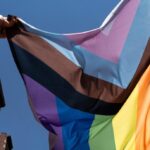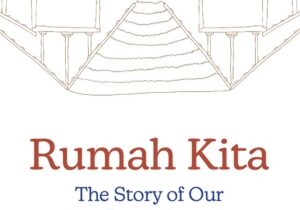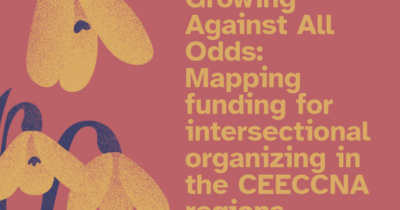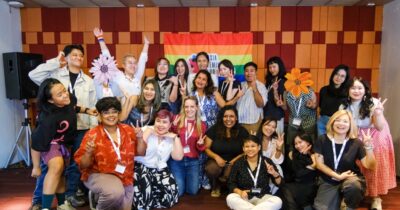On May 15, 2023, the Urgent Action Sister Funds, a global consortium of feminist funds, released a new report titled “How Can We Ground Ourselves in Care and Dance Our Revolution?” The report emerges out of an accumulation of UAF’s decade-long research on global feminist movements. Its findings represent UAF’s dedication to feminist activism and exemplifies its evolution in supporting research and initiatives upholding feminist care and protection.
The Urgent Action Sister Funds consist of Urgent Action Fund-Latin America and the Caribbean (UAF-LAC), Urgent Action Fund Asia & Pacific (UAF A&P), Urgent Action Fund-Africa (UAF-A) and Urgent Action Fund-For Feminist Activism (UAF-FFA) formerly Urgent Acton Fund for Women’s Human Rights. Together, these feminist funds have accumulated vast research and insights into the successes and challenges within the feminist movement particularly in regards to care.
Tatiana Cordero, former Executive Director of UAF-LAC, proposed the report in 2017 to focus primarily on the Global South and answer the question: “What has happened with the care and protection of women, trans and non-binary activists in the world”. With contribution from the UAF Advisory Council, “How Can We Ground Ourselves in Care and Dance Our Revolution?” relies on “qualitative methodology with a narrative approach” seeking to amplify and share the voices and personal stories of activists.”
Channel has long supported UAF’s research on movements and care, having first begun funding UAF projects back in 2006. This funding supported the creation of several works including What’s the point of the revolution if we can’t dance?, a book on the “situation of women human rights defenders, on how they felt, how they were affected and how they faced the risks to which they were exposed in their work.” Funding for projects such as the Sustaining Activism Initiative, UAF’s early research, has continued extensively for the past decade. This has aided in the amplification of UAF’s work on care and movements, serving as a critical resource for activists all around the world. UAF’s new report is a further evolution of its previous research and aims to highlight the need for a women-centered approach to human rights, activist burnout, and funder interactions. The report is vital in representing UAF’s lengthy work within the feminist field and the paradigm shift it has created with feminist activism and research.
The new report begins by providing the motivation for the project and its methodology. It relies on 141 interviews conducted in 63 countries with women, trans and non-binary activists, donors, and “practitioners” among others. The interviews were conducted by 10 researchers in more than seven languages. Alongside the interviews, the report relied on letters written by participants depicting their experiences with care.
The objectives of the report are to “support activists, organizations, movements and donors to incorporate practices and reflections regarding holistic care and protection” and create sustainable and strong solidarity networks among activists. These objectives and the findings of the report were established through three meetings between the Urgent Action Funds and the Advisory Group. In 2017, the group met in La Guajira, Colombia. In this meeting, participants “got to know each other and shared individual and collective trajectories, to thus build a timeline of the landmarks in this path of care and protection.” This meeting established the core concepts of the report: self-care and collective care, spirit, power, and politics of care. The key question that emerged from this meeting was: “How do we practice self-care and collective care within?”
In 2018, the group met in Colombia’s Rosario Islands. New questions posited in this meeting revolved around donors, their responsibility to movements and perception of care, and the decolonization of well-being. In 2019, the group met in Tepoztlán, Mexico. This meeting followed the completion of interviews and region analysis for the report. Thus, it served as an opportunity to come together to “share, analyze and provide feedback on the preliminary findings.” This included discussing conclusions on donor perspectives and challenges encountered throughout the process. The core question developed in this meeting was: “How do women, trans and non-binary activists in the world experiment and visualize care and protection today, at the individual and organizational level, taking into account the context, identity(ies), particularity(ies), trajectory and stories of each one of them?”
The findings of the report can be broken down into six topics:
- personal history, specificities and feelings of each activist
- challenges, threats and risks of activism
- personal practices of care and protection
- care and protection collective practices
- the donors’ role
- care and protection as concepts, diversity and political aspects
The report continues by providing an in-depth look at each of these topics and their findings. For example, in regards to risk, the report found that 9 out of 25 Latin American activists “had been attacked for their activism in favor of territory.” Other risks included harassments, censorship, physical violence, repression, and threats. The report includes over a hundred examples of these findings through quotes from activists sharing their stories and experience. These findings are also broken down by regions and provide further statistics about the activists themselves.
The analysis continues with a look at what care is and what strategies have been utilized and should be implemented to uphold care. The challenges that activists face and their care practices are also touched on. Additionally, the report discusses funding and what donors can do to better support activists and their work. These changes and principles include emphasizing respect and trust, being open to diverse approaches, upholding labor rights, improving funding quality, and supporting community practices and campaigns. The report concludes with a discussion on the future of activism and with in-depth insights into the work of each of the Urgent Action Funds.
The Equality Fund‘s report “Unfolding the Tapestry: Weaving Themes and Strategies of Feminist Crisis Response” also highlights these ideas of care and feminist activism. It references the UAF report and highlights UAF-Africa’s Feminist Republik, a program that aims to “cultivate a care and healing movement culture for feminists and women and LBTQI+ human rights defenders”, and UAF-FFA’s Sisterhood and Reconstruction Women’s Fund.






